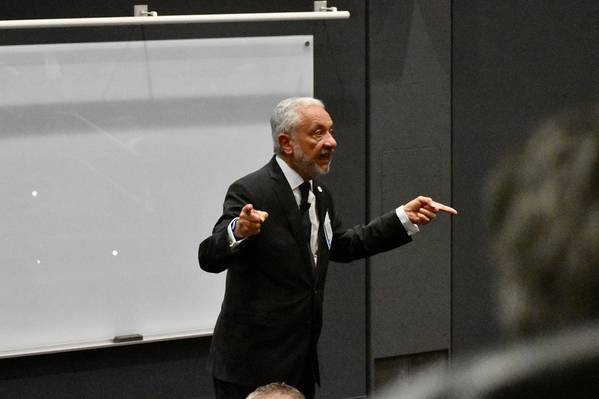
The Panama Canal Administrator, Dr. Ricaurte Vásquez Morales, delivered the 43rd Annual William A. Patterson Distinguished Transportation Lecture at Northwestern University this week, in which he laid out the crucial role the Panama Canal has played in the development of global trade and the impact it has had on the greater evolution of humanity in Panama, and throughout the world.
The Northwestern University Patterson Transportation Lecture is an award that recognizes Vásquez and influential leaders from all facets of the transportation industry.
Tracing the evolution of the waterway’s conception as a 16th century crossroads, to its 1914 debut as a formal channel for global shipping, Vásquez described the innovation and evolution among the canals earliest customers and supporters that allowed the canal to develop into the crucial position it holds today within the transportation industry.
Today, the powerhouse hub known around the world as the Panama Canal links the Atlantic and Pacific Oceans and connects more than 1,920 ports throughout 170 countries. Its presence shortens shipping routes by as much as 8,000 nautical miles and provides global consumers a faster, more reliable supply chain than on land.
Vásquez also emphasized that the United States remains the canal’s top customer, which accounts for 40% of the waterway’s international trade and supports more than $270 billion USD in annual U.S. cargo. American agricultural producers rely on the waterway to route their crops such as soybeans and corn to Asian and European markets.
To stay competitive in the face of global climate change, the Panama Canal Authority (ACP) continues to push forward strategic initiatives. These include the Río Indio Project, expected to double the canal’s water storage capacity, and the launch of the NetZero Slot, an incentive for shippers to adopt cleaner maritime technologies.
The Panama Canal also plays a vital role in the energy sector. U.S. flag ships lead among global shipments of LNG and LPG. “55% of trade goes through the Panama Canal go through the Third Set of Locks, especially LNG and energy products, so we have decided to enhance capacity to make sure that the Panama Canal remains relevant and reliable," said Vásquez.
To help satisfy rising energy demands in Asia, the ACP Board of Directors recently approved a new bidding process for a new gas pipeline designed to transport up to 1 million barrels per day, to better enable exporters of gas like the U.S. According to Dr. Vásquez, this pipeline also helps to secure the canal’s position as an essential player in the constantly evolving energy landscape.



